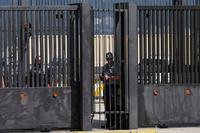The Air Force says a pilot program has found that putting resources for survivors of sexual assault, domestic abuse, stalking and cyberbullying in one central base office made reporting and finding support easier.
At the beginning of this year, the service ended a program tested at five bases where officials put all the offices to report assault, harassment and domestic violence under one roof. In a press release on Wednesday, Brian Demer, a program specialist with the Department of the Air Force Integrated Resilience, said they saw successes with the test.
"Cumbersome and poorly communicated processes for receiving care stand out as one of the barriers to receiving care across [department] installations," Demer said. "Data showed this has been reduced at test installations. Victims and survivors reported having to share their experience 10 or more times was a barrier as well; they reported that co-location has mitigated that by ensuring they get to the right provider the first time."
Read Next: VA Moves to Educate Vets on Fraud, Scams Amid PACT Act Filings and Camp Lejeune Water Litigation
The pilot locations included Joint Base San Antonio-Lackland in Texas; Vandenberg Space Force Base in California; Joint Base Langley-Eustis in Virginia; Misawa Air Base in Japan; and Offutt Air Force Base in Nebraska.
But following the success of the test, it may become a permanent solution to better getting service members and survivors the help they need.
The pilot, which ran from August 2022 to January, sought feedback and data on how efficient it was to combine all the offices -- ranging from the bases' Domestic Abuse Victim Advocate and Sexual Assault Prevention and Response Victim Advocate to the Religious Support Teams and Victim's Counsel -- in one place.
The results were favorable, according to the press release.
"A key benefit of co-located services was an increase in the willingness to report incidents," the news release said. "At pilot installations, data indicated decreased time for reporting incidents, from 146 days to 46 days."
The pilot program comes as the Air Force reckons with reports of frequent instances of physical and mental abuse in the ranks, and on the heels of high-profile cases in the military, such as the sexual harassment and subsequent murder of Army Spc. Vanessa Guillen in 2020.
Findings of a survey compiled into a wide-ranging report, released in November 2021 by the services, found that more than half of Air Force and Space Force personnel experienced some type of mental or physical abuse while on orders.
Of the nearly 70,000 active-duty personnel, reservists and civilians who responded to the survey, roughly two-thirds of the women and 48% of the men reported "interpersonal violence," ranging from psychological incidents like rude jokes or belittling and bullying to physical abuse such as sexual assault, dating violence, family violence or workplace violence.
Lisa Surette, a senior policy analyst for sexual assault and sexual harassment response with the service, is working alongside Demer for implementing the idea across the Department of the Air Force.
"The burden shouldn't be on the victims and survivors to know where to find resources," Surette said. "Co-location will ease that burden by placing services in a single, easily accessible location."
-- Thomas Novelly can be reached at thomas.novelly@military.com. Follow him on Twitter @TomNovelly.
Related: Air Force Launches Program to Help Sexual Assault, Harassment Survivors at 7 Bases












